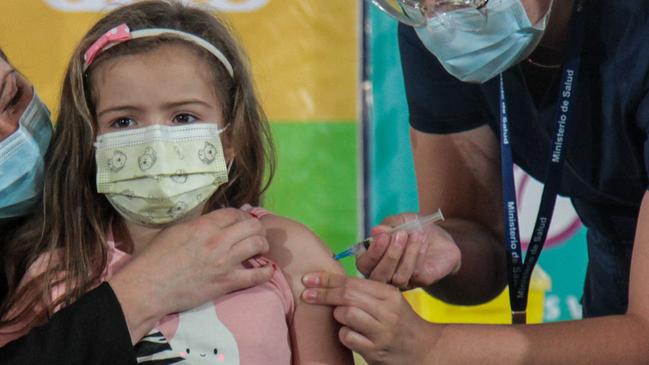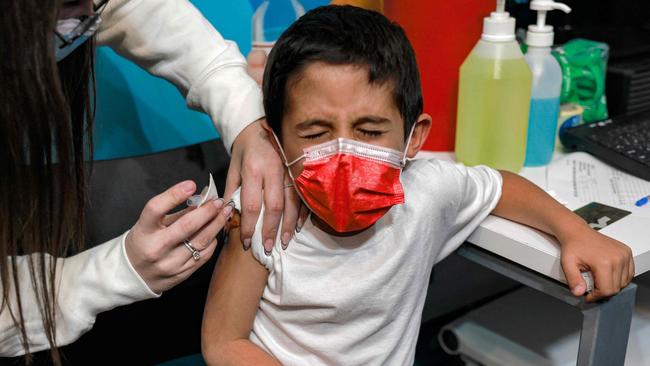When kids aged five to 11 can get the Covid jab
The vaccine rollout has been confirmed for young Aussie children in what Scott Morrison says will be “welcome news for millions of families”.
Coronavirus
Don't miss out on the headlines from Coronavirus. Followed categories will be added to My News.
Kids aged five to 11 years will be able to roll up their sleeves for a Covid jab from next month after Australia’s expert immunisation panel gave Pfizer’s paediatric vaccine the green light.
The panel has recommended that a third of the adult dose be given to all children in the cohort, with an eight-week interval between first and second shots.
Their advice follows the Therapeutic Goods Administration (TGA) on Sunday giving the vaccine provisional approval for use among younger children.
Bookings for vaccine appointments will open in late December with almost 580,000 Victorian kids eligible when the rollout begins from January 10.
“This will be welcome news for millions of families across the country who want the opportunity for their children to be vaccinated,” Prime Minister Scott Morrison said.
“They can have peace of mind knowing this has the tick from the best medical regulators in the world.”

The jab will be available at GPs, pharmacies and state clinics, with states responsible for school-based immunisation programs.
The interval between first and second doses is recommended to be eight weeks, in line with clinical evidence from Canada.
However, authorities say it can be shortened to three weeks in special circumstances, such as during an outbreak.
Trials have shown the vaccine to be more than 90 per cent effective at preventing symptomatic Covid-19 seven days after a person’s second dose.
Health Minister Greg Hunt said vaccinating children could help reduce community transmission, and help prevent kids passing the virus on to younger siblings, grandparents and the wider community.
“Australians can be reassured that by vaccinating their children against COVID-19 they have done everything possible to keep their child safe from this virus,” Mr Hunt said.

Approval from Australian Technical Advisory Group on Immunisation (ATAGI) is the second of four critical steps to be completed before January 10, with vaccination training for healthcare providers and batch testing of doses to be completed over coming weeks.
Australia’s vaccine chief, Lieutenant General John Frewen, this week said the nation would have enough supply to protect the 2.3 million children in that cohort.
He said the aim was for all children aged five to 11 to get at least one Covid-19 jab before school returns next year.
Daniel Andrews said school-based vaccination programs would make “a lot of sense”, adding they can get more jabs in arms if everyone works together.
Health officials are also expected to release advice about Moderna’s vaccine for children aged six to 11 years over the coming weeks.
It comes as a new national poll today reveals almost half of Australian parents would be more likely to have their child immunised against Covid, if they were reimbursed for time taken off work to get to the appointment.
The Royal Children’s Hospital survey of just over 1200 parents in July also found that while a third of parents have been on the fence about vaccinating their young children, two thirds say they would be more likely to do so if it was administered in a local and familiar setting like the GP or school.
Director of the RCH National Child Health Poll and paediatrician, Dr Anthea Rhodes said it was “really important we get it right the first time for children and parents in this younger age group”.
“It will be really difficult for parents to come back a second time if their child has had a really negative experience perhaps with distress relating to the needle, or if parents had a long wait,” Dr Rhodes said.
“We know parents with young children are often juggling a lot of factors, so the needs of young children unique. This is not going to be the same as a vaccination program for adults, or even the same as a vaccination program for teenagers.




